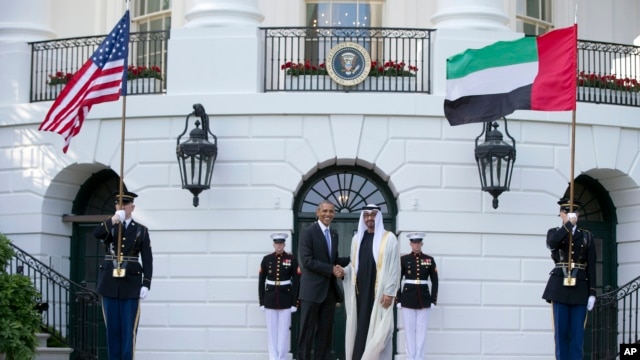voanews.com
FILE - President Barack Obama, left, shakes hands with Sheikh Mohamed bin Zayed Al Nahyan, Crown Prince of Abu Dhabi, Deputy Supreme Commander of the UAE Armed Forces and Chairman of the Executive Council of the Emirate of Abu Dhabi, as he arrives at the
July 09, 2015 12:51 AM
The United States and United Arab Emirates launched a new effort Wednesday to counter the Islamic State group using social media to confront the militants' ideology and present "moderate and tolerant voices from across the region."
Named the Sawab Center and based in Abu Dhabi, the project issued messages on Twitter and posted a YouTube video saying the militants were twisting Islam to spread hate, fear and intolerance.
U.S. Under Secretary of State for Public Diplomacy and Public Affairs Richard Stengel told Alhurra that the goal is to both use information to dissuade people from joining the Islamic State and to "take offline" those who are using social media to try to convert new recruits.
"One of the ideas of the Sawab Center and what we do in terms of messaging ourselves from Washington is to try to stem the flow of foreign fighters," Stengel said. "To, if somebody is debating whether to go, tell them that the mythology of what Daesh [Islamic State] is creating is false, you know, the caliphate isn't a paradise -- there's no plumbing, there's no electricity, there's no Internet access."
Stemming the flow of fighters into Iraq and Syria is one of the main goals set out by President Barack Obama to counter the Islamic State. Coalition efforts also include a nearly year-long bombing campaign with more than 5,000 airstrikes, as well as work to cut off funding to the militants.
The result has been progress in retaking control in some areas along with fighters on the ground, but the campaign has so far not dislodged the Islamic State group from its main stronghold in Raqqa, Syria, or from a number of major cities in Iraq.
Stengel said the coalition, which includes more than 60 nations, is having success, and that having a common enemy has made for a closer relationship between the United States and the members of the Gulf Cooperation Council. But he repeated Obama's view that the fight against terrorism is a "generational struggle," not one to measure in months or days.
"I think it's not realistic to say that any form of terrorism will go away, or that any manifestation of Daesh or ISIL will go away, but as an acute threat, as an existential threat, as an expanding threat, that will be reversed and it already is being reversed," he said.
Stengel acknowledged that "nobody is immune" to the threat posed by the Islamic State, but that the situation is different for the United States than it is for nations in the Middle East.
"I don't think it's quite an existential issue for America the way it is for countries in the region where it's on your border and they're advancing and they're trying to create a state," Stengel said. "So I think the problem is more acute here, but everybody has the problem as well."


No comments:
Post a Comment